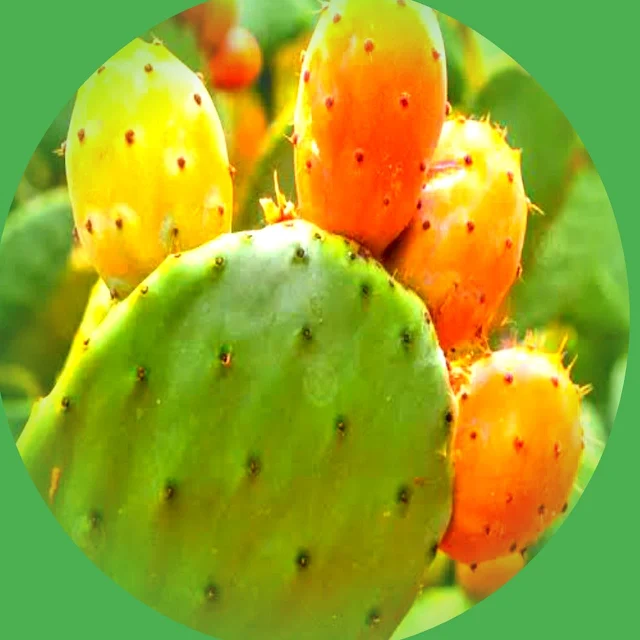Benefits of prickly pear
Prickly pear or
prickly pear is the same name for delicious summer fruit growing on the edge of
the plates of a certain type of cactus plant.
Oval prickly pear
fruits can range in color from yellow and light green to orange, pink and red, depending
on their variety and maturity.
Although all cacti
are native to the Americas, prickly pears and their fruits have spread around
the world to North Africa, Europe and the Middle East.
This fruit contains
a unique combination of nutrients, including high levels of vitamin C, B family vitamins, magnesium, potassium, calcium, copper and
dietary fiber, which makes its benefits amazing for health and disease
prevention:
Boost immunity/1
In terms of organic
compounds, prickly pear fruit contains high levels of flavonoids, polyphenols,
and betaline, all of which have a positive effect on health.
Research published
in the American Journal of Clinical Nutrition reveals that eating spiny fruit
is positively associated with detoxification and antioxidant activity because
it contains elevated levels of vitamin C and E
Interestingly, one
serving of prickly pear contains one-third of our daily need for vitamin C,
which acts as an antioxidant and
boosts the immune system in addition to increasing rates of white blood cell
production, muscle formation and bone tissu
bones and teeth
It is not possible
to talk about prickly pear without addressing the calcium that the cactus fruit
contains in a large percentage, which prevents dental problems and age-related
bone disorders such as osteoporosis.
3.
Help with digestion
Help with digestion
Prickly pear fruit
contains as high a level of dietary fiber as most fruits and vegetables, so
this spiny fruit can help you regulate digestion.
Fiber increases
stool volume to help food pass through the digestive system easily, thus
eliminating constipation, bloating, and serious digestive problems such as
stomach ulcers.
4.
Promote heart health
Promote heart health
There are a number
of components of prickly pear that can make it very good for heart health. The
high levels of fiber in fruit can help lower levels of bad cholesterol (LDL)
in the body.
The large levels of
potassium in prickly pear can help lower blood pressure by relaxing blood
vessels and reducing pressure on the cardiovascular system. The betaline in
prickly pear has also been linked to strengthening the endothelial walls of
blood vessels and thus reducing the chances of impairing blood circulation.
In general, this
fruit may prevent atherosclerosis, coronary heart disease and stroke.
5.
Reducing cancer
Reducing cancer
According to the
American Journal of Clinical Nutrition (2004), spiny fruit contains high levels
of flavonoids, polyphenols and betaline.
These compounds can act as antioxidants and
neutralize free radicals before they cause healthy cells to mutate.
In addition, research tests on laboratory mice
led by a team from the University of Arizona found that prickly pear helped
suppress tumor growth. However, the researchers stated that more studies were
needed because the mechanism of the anti-cancer effect was not fully
understood.
6.Skin
protection
protection
The antioxidants in
prickly pear may protect the skin, reduce the chances of premature aging,
improve vision, prevent macular degeneration, and increase brain strength and
function.
Studies conducted
in Germany have shown high levels of tocopherol and beta-carotene in cacti
fruit, both of which are known to be highly beneficial for skin and eye health,
and polyphenols have also been linked to increased cognitive activity.
7.Help
with weight loss
with weight loss
With high fiber,
nutrient density, low calories, and saturated fat, prickly pears can keep your
body in a healthy shape without adding any extra weight, and fiber and
carbohydrates reduce overeating.
8.Reduce
inflammation
inflammation
In traditional
medicine, aloe vera fruits have been mashed and applied topically to inflamed
body parts. When eating prickly pears, the antioxidants and minerals in it can
reduce inflammation, especially in conditions such as arthritis, gout or muscle
strain.
Prickly pear harms?
A study by Seoul
National University confirmed the anti-inflammatory properties of prickly
pears. It can also be applied topically to get rid of swollen insect bites,
which is actually a method used hundreds of years ago.
Prickly pear is a
healthy and tasty type of fruit, and there is usually no significant harm to
eating it. However, there are a few points to consider:
1.
Thorns: Prickly pear has small, sharp thorns, so it should be handled with
caution to avoid infection.
2.
Allergies: Some people may be allergic to prickly pear, and may notice symptoms
such as itching or rash after eating it. If you are allergic to other fruits,
there may be a chance of a similar reaction.
3.
Fiber: Prickly pears are high in fiber, meaning that eating them in large
quantities may lead to digestive problems such as bloating or constipation.
Therefore, it is preferable to take it in moderate amounts.
4.
Calories: Despite its health benefits, prickly pear contains a moderate
percentage of calories, so it should be eaten in moderation if you are
following a specific diet.
you should remember that prickly pear is a healthy and nutritious fruit, and
can be part




Comments
Post a Comment